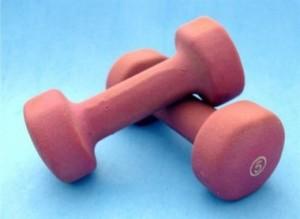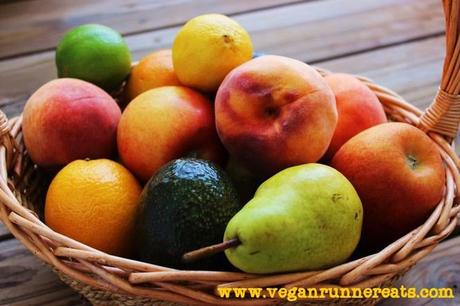Hello everyone! Back in the saddle and welcoming a brand new blogger to the VBU! family – Alina, author of Vegan Runner Eats. Here is her bio, “Alina Zavatsky embarked on a vegan journey in May 2013 and never looked back! She decided to start a blog to document how her newly adopted plant-based vegan diet was going to influence training for her second marathon. Alina shares everything she’s learned so far about veganism and exercise, and develops vegan recipes on her blog, www.veganrunnereats.com.” Follow Alina’s blog on: Facebook, Twitter and Pinterest. Welcome Alina!
5 Tips About Nutrition Every Vegan Athlete Should Know.
When it comes to nutrition and athletic performance, we’ve all heard so much information – often contradictory – that it’s hard not to get puzzled sometimes. And for those of us who has made a switch to a vegan diet while staying physically active, figuring out nutrition for optimal performance might seem like an even more difficult task.
Today I’m going to cover some basic facts about nutrition for vegan athletes. It doesn’t matter if your idea of exercise is a half an hour walk every night, 2 hours

A couple words about myself: I switched to veganism after doing a lot of reading about the optimal nutrition for athletes. It turned out that a lot of top-tier professional runners, triathletes etc. successfully follow a vegan diet. Eating plant-based foods and ditching animal products has shown to speed up recovery between exercise sessions. As a dedicated recreational runner who has completed a few half marathons and one full marathon, that’s just what I was looking for! Moreover, I decided to start a blog to document how my newly adopted vegan diet was going to help me in training for my second marathon.
All of this brings us to nutrition. Since my goal is to train for a marathon in a healthy way while eating a plant-based vegan diet, I’ve done a lot of research to make sure I was doing everything right. Nobody’s perfect, of course, and I’ll admit that since starting my vegan marathon training journey, I’ve had weeks when I was bursting with energy while running/working out hard, and other weeks when I was just dragging by with a similar exercise load. This loosely translates that my nutrition might not have been perfectly balanced at times, and a number of other factors (sleep, stress, etc.) were sucking energy out of me.

While it’s hard to control our sleep or stress levels, we can all put some effort into making our nutrition better. I admit that I’ve made some mistakes in my vegan diet, but after doing proper research I’ve put up a list of facts that can benefit us all no matter of our physical activity level. Here we go:
Basic guidelines for physically active people on a vegan diet
1. You don’t need more protein – just more calories! This is a fact that a lot of vegan fitness gurus emphasize. Our bodies need plenty of energy to sustain a hard effort when exercising or training for a race. While protein is vital to us all, it’s not the lack of it in a vegan diet that makes us exhausted – it’s the lack of overall calories! A common misconception about a vegan diet is that it implies eating nothing but salad and thus lacks in protein, but people often overlook the fact that plants, grains, and starchy vegetables supply a decent amount of it. As long as you consume a wide variety of plant-based foods, you’re good to go! Even when training for a marathon.
2. Eat carbohydrate-rich food in its natural state before and after exercising. Even if your stomach is averse to food very early in the morning before an am workout, you’ve got to top off your glycogen (carbs stored in your muscles and liver for use during exercise). This will help you maintain a harder effort, last longer, and recover better after the workout! I’m not a big fan of eating very early, but I’ve been working on it: half a banana or 3-4 dried dates with a cup of coffee 30-60 minutes before a run usually sit well in my stomach, but you can always experiment with other foods to find out what works for you. However, try to avoid a lot of fiber at this meal as fiber stays in your stomach longer, thus increasing your chances of gastrointestinal trouble when you least need it!
After the workout, you’ve got 30-60 min to have another breakfast: the carbs consumed at this time go directly to your muscles and liver to be stored as glycogen for your next exercise session. An ideal ratio of carbs to protein at this meal is considered to be 4 to 1. Oatmeal, cereal, pancakes, smoothies (like the Swamp Monster Smoothie from my blog!) all work well.
3. Don’t get too hung up on numbers in your diet! Whether it’s about calories or protein/carbs/fat ratio, figuring out numbers can distract your attention from a bigger goal – eating a healthy diet full of a variety of whole food, plant-based components for optimal health and athletic performance. T. Colin Campbell, professor emeritus of nutritional biochemistry at Cornell University, describes this number-picking (my phrasing) in his book Whole: Rethinking the Science of Nutrition as a ‘reductionist’ approach in science and all areas of life opposed to a more beneficial to us ‘wholistic’ approach. Campbell and a number of other outstanding scientists and doctors propose the consumption of starchy vegetables and grains complemented with vegetables, beans, fruits, and berries close to their ‘whole’, natural state as a diet that’s most beneficial to human health. ( For more on this, see the work of John McDougall, Caldwell Esselstyn Jr., Neal Barnard, Joel Fuhrman and others.)
4. A variety of whole, plant-based foods benefits us as athletes! There are numerous ways of how a whole food plant-based diet brings out the best in us:
- - Optimized recovery: antioxidants found in plants reduce oxidative effect of exercise on our bodies (less inflammation!) and help flush out lactic acid that makes our muscles sore. Plants contain up to 64 times the amount of antioxidants than meat, fish, dairy, and eggs. Watercress, cherries, and citrus fruit have shown positive effect on post-exercise recovery in studies. (For more on this, check out the work of Michael Greger and his awesome website www.nutritionfacts.org.)
- - No need for supplements! Vitamins and micronutrients found in whole foods act much more efficiently inside our bodies than their pill forms. That includes not just synthetically derived vitamins, but also the ‘all-natural’ vitamin brands. Possible explanation? The whole is more than the sum of its parts when it comes to plants: the combination of all components of plant-based foods (both known to us and not yet discovered) works much better together than separately. Plus, sometimes high doses of vitamins found in pills can be toxic for us! The only exception is vitamin B12: most plant-based diet advocates agree on supplementation of this vitamin for vegans, plus it’s not toxic to us at higher doses.
- - Nothing to weigh us down! Consuming plants provides us with macro- and micronutrients, fiber, antioxidants, vitamins, minerals – and none of the artery-clogging cholesterol* or hard-to-digest animal protein. Studies by Caldwell Esselstyn Jr. and other researchers have shown that eliminating all added oils from our diet can repair the endothelial cells that make up the inner lining of our arteries, thus not only preventing, but also reversing heart disease! Imagine how much your athletic performance is going to improve once you ditch all the junk out of your diet!
5. Reevaluate your sodium intake! We’ve all heard that too much sodium in our diets can lead to a number of health problems, high blood pressure being one of them. Some of us might have even tried to reduce the amount of salt they add to home-cooked food. However, if you participate in endurance sports that last for hours (running, cycling, triathlons, etc.), you might be losing too much sodium through sweat. We need to maintain a certain level of sodium in our blood and tissues, so if you are a heavy sweater, you might want to consider adding a sports drink with some sodium and potassium during long bouts of exercise (more than an hour), and eating something salty after your workout. You might have even heard about or experienced a condition called hyponatremia during long runs: dangerously low levels of sodium in the body paired with drinking sodium-free water cause swelling of brain and tissues, which results in disorientation, drastic decrease in performance, and sometimes fainting. As you see, too little sodium can be just as painful as too much.
While this list of tips on nutrition for newly vegan athletes can be expanded, it covers basics that all athletes (including more experienced vegans) can benefit from. I recommend that we all ( myself too!) come back to this list every now and then to gauge our athletic progress, and especially if our performance stalls or if we start feeling sluggish. Also check out my list of 10 vegan pantry staples that can take your health and performance to the next level.
Are there any other tips you’d like to add to this list? Let us know what you think in comments below!
